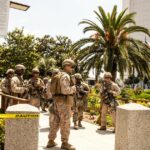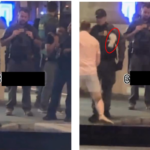In a significant shift from past practices, Washington, D.C.’s Metropolitan Police Department (MPD) has enacted a new policy allowing increased cooperation with federal immigration authorities. This move, orchestrated under an order signed by Police Chief Pamela Smith, marks a departure from previous policies which strictly limited the extent of collaboration between MPD and immigration officials.
The newly signed order elaborates that MPD officers are now permitted to share information about individuals not currently in police custody, and to assist in the transportation of federal immigration agents and individuals detained by them. This level of cooperation has been restricted until now, with stringent guidelines preventing local officers from sharing custody data of detainees with federal immigration bodies due to D.C.’s sanctuary status. The sanctuary laws, designed to build trust between local law enforcement and immigrant communities, discourage practices that may lead to detentions solely based on a person’s legal status in the U.S.
Despite the changes, certain safeguards remain intact. The order adheres strictly to the overarching policies which prohibit MPD officers from using their database access to check an individual’s immigration status directly. Additionally, the policy still shields anyone whose sole crime is residing in the U.S. illegally from being apprehended by local officers.
The broader implications of such policy changes are substantial, especially taking into account the complex landscape of immigration law and local law enforcement’s engagement with communities including immigrants. Chief Smith’s order doesn’t negate D.C.’s status as a “sanctuary city”—a term used to describe cities that limit their cooperation with the national government’s effort to enforce immigration law—but it certainly blurs the lines on what interactions are deemed acceptable.
Mayor Muriel Bowser’s recent attempt to repeal the sanctuary city status in the 2026 budget bill was thwarted by the D.C. Council in June, highlighting the contentious nature of immigration policies at the city level. In the backdrop of ongoing national discussions and policy shifts on immigration, this development within the D.C. Police Department has sparked debates and raised questions about the potential impacts on community trust and safety.
Adding another layer to this complex scenario, the federal administration under President Trump has taken dramatic steps in enforcing immigration laws and policies. A notable event was the enforcement of Section 740 of the District of Columbia Home Rule Act of 1973, where President Trump declared that the D.C. MPD would be under direct federal control for a period extending up to 30 days. This directive was attributed to Attorney General Pam Bondi as a measure under a public safety emergency, fundamentally altering the operational command of MPD away from local to federal oversight.
The transformation in command was closely followed by an increase in federal presence across Washington, D.C. Nearly 1,500 federal law enforcement officers and National Guard members were deployed to patrol the streets, promoting Trump’s agenda of stringent immigration enforcement alongside maintaining public order. Among these officers were agents from Immigration and Customs Enforcement, Customs and Border Patrol, United States Secret Service, and U.S. Marshalls, tasked with various operational duties that extend into the realm of immigration enforcement.
Meanwhile, arrests linked to immigration have seen an uptick as highlighted by FBI Director Kash Patel. Specifically since August 7th, over 140 arrests have been reported, with a substantial number being directly tied to immigration issues. These arrests and the visible federal maneuvers in D.C. not only exemplify the federal government’s resolve in matters of immigration but also preset challenges to local policymaking on sanctuary laws.
As these developments unfold, the response from the Metropolitan Police Department and the Mayor’s office is keenly awaited. With policies evolving and federal priorities asserting immense pressure, the equilibrium between adhering to local sanctuary policies and aligning with federal immigration laws is more fragile than ever.
This progression within D.C.’s legislative and enforcement arena, under the scrutinizing eye of national leadership, represents a critical juncture for policy makers, law enforcement, and the communities they serve. As the dialogue around sanctuary cities and cooperation with federal immigration authorities continues to evolve, it is clear that the decisions made today will shape the landscape of immigration policy and local governance for years to come. The ongoing narrative not only raises questions about the balance of power between federal and local entities but also puts a spotlight on the intricate dance of diplomacy, law enforcement, and human rights.
Contributions to this report were made by Eleanor Watson, providing insightful perspectives on the evolving dynamics within Washington, D.C., underlining the complex interplay of local and federal directives in the sphere of immigration and law enforcement cooperation.









